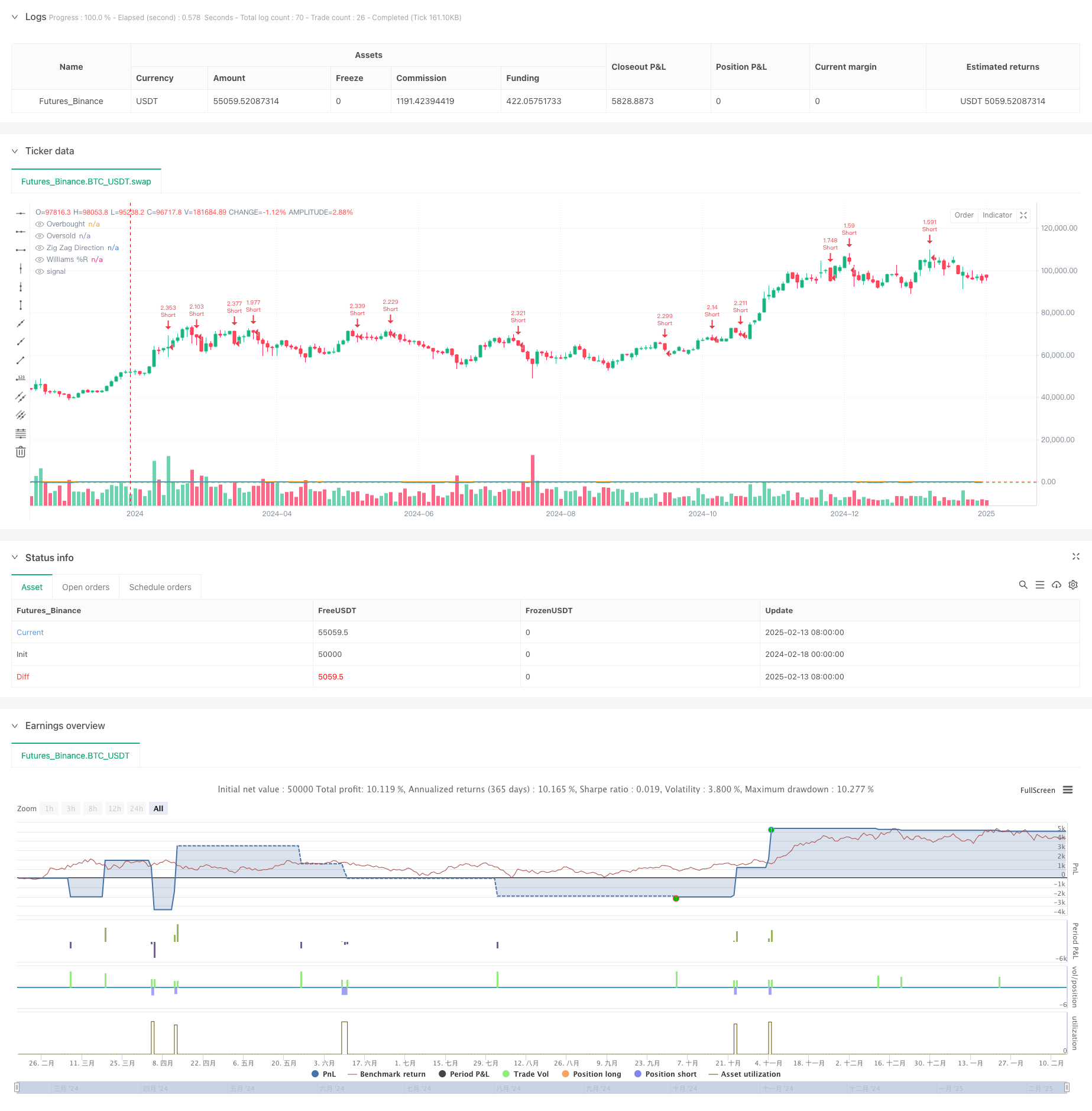
概述
该策略是一个结合了之字形(ZigZag)指标和威廉指标(%R)的多维度交易系统。通过之字形指标识别重要的波段高点和低点,同时利用威廉指标在市场达到超买或超卖状态时确认入场点。这种组合不仅能够捕捉市场的主要趋势转折点,还能通过动量确认来提高交易的准确性。
策略原理
策略的核心逻辑基于两个主要组成部分: 1. 之字形指标通过设定的深度和偏差参数识别显著的波段高低点,过滤市场噪音,确定趋势方向。当形成新的波段低点时表示上升趋势开始,新的波段高点则表示下降趋势开始。 2. 威廉指标通过比较当前价格与特定周期内的最高价,计算出市场的动量状态。当指标值突破-80时表示超卖(潜在买入机会),突破-20表示超买(潜在卖出机会)。
策略的交易规则如下: - 做多条件:之字形指标识别新的波段低点且威廉指标从超卖区域向上突破 - 做空条件:之字形指标识别新的波段高点且威廉指标从超买区域向下突破 - 止损设置为1%,止盈设置为2%
策略优势
- 多维度确认:通过趋势和动量双重确认,提高交易信号的可靠性
- 自适应性强:之字形指标的偏差参数可以根据市场波动率动态调整
- 风险控制完善:采用固定百分比的止损止盈策略,控制每笔交易的风险
- 可视化效果好:通过标签和图形清晰展示交易信号,便于分析和优化
策略风险
- 震荡市场风险:在横盘市场可能产生频繁的假突破信号
- 滑点风险:在快速行情中可能面临较大滑点
- 参数敏感性:指标参数的选择对策略性能影响较大
- 信号滞后性:由于需要确认形成新的波段点,可能错过一些快速行情
策略优化方向
- 增加市场环境过滤:可以添加波动率指标来识别市场状态,在不同环境下使用不同的参数设置
- 动态止损优化:可以基于ATR或波动率动态调整止损位置
- 引入成交量确认:在信号生成时增加成交量验证
- 时间过滤:可以添加交易时间段过滤,避免在波动较大的时段交易
总结
这是一个结合趋势跟踪和动量交易的完整交易系统。通过多重技术指标的协同作用,能够在保持较高胜率的同时有效控制风险。虽然存在一定的滞后性,但通过合理的参数优化和风险管理,可以实现稳定的交易效果。该策略特别适合中长期的趋势行情,在市场出现明显方向性机会时表现更好。
策略源码
/*backtest
start: 2024-02-18 00:00:00
end: 2025-02-15 08:00:00
period: 2d
basePeriod: 2d
exchanges: [{"eid":"Futures_Binance","currency":"BTC_USDT"}]
*/
//@version=6
strategy("Zig Zag + Williams %R Strategy", overlay=true, default_qty_type=strategy.percent_of_equity, default_qty_value=300)
// ====================
// === Parameters
// ====================
// Zig Zag parameters
zigzag_depth = input.int(5, title="Zig Zag Depth", minval=1)
zigzag_deviation = input.float(1.0, title="Zig Zag Deviation (%)", minval=0.1, step=0.1)
// Williams %R parameters
williams_length = input.int(14, title="Williams %R Length", minval=1)
williams_overbought = input.int(-20, title="Williams %R Overbought", minval=-100, maxval=0)
williams_oversold = input.int(-80, title="Williams %R Oversold", minval=-100, maxval=0)
// ====================
// === Zig Zag Calculation
// ====================
// Initialize variables
var float last_pivot_high = na
var float last_pivot_low = na
var int zz_dir = 0 // 1 for uptrend, -1 for downtrend
// Calculate pivots
pivot_high = ta.pivothigh(high, zigzag_depth, zigzag_depth)
pivot_low = ta.pivotlow(low, zigzag_depth, zigzag_depth)
// Update Zig Zag direction and last pivots with deviation
if (not na(pivot_high))
if (zz_dir != -1) // Only change to downtrend if not already in downtrend
if (na(last_pivot_high) or (high[zigzag_depth] > last_pivot_high * (1 + zigzag_deviation / 100)))
last_pivot_high := high[zigzag_depth]
zz_dir := -1
label.new(bar_index[zigzag_depth], high[zigzag_depth], text="PH", color=color.red, style=label.style_label_down)
if (not na(pivot_low))
if (zz_dir != 1) // Only change to uptrend if not already in uptrend
if (na(last_pivot_low) or (low[zigzag_depth] < last_pivot_low * (1 - zigzag_deviation / 100)))
last_pivot_low := low[zigzag_depth]
zz_dir := 1
label.new(bar_index[zigzag_depth], low[zigzag_depth], text="PL", color=color.green, style=label.style_label_up)
// ====================
// === Williams %R Calculation
// ====================
// Calculate Williams %R manually
highest_high = ta.highest(high, williams_length)
lowest_low = ta.lowest(low, williams_length)
williams_r = (highest_high - close) / (highest_high - lowest_low) * -100
// ====================
// === Trade Conditions
// ====================
// Assign crossover and crossunder results to variables
crossover_williams = ta.crossover(williams_r, williams_oversold)
crossunder_williams = ta.crossunder(williams_r, williams_overbought)
// Define trade conditions
longCondition = (zz_dir == 1) and crossover_williams
shortCondition = (zz_dir == -1) and crossunder_williams
// ====================
// === Trading
// ====================
// Enter Long
if (longCondition)
strategy.entry("Long", strategy.long)
label.new(bar_index, low, text="BUY", color=color.green, style=label.style_label_up)
// Enter Short
if (shortCondition)
strategy.entry("Short", strategy.short)
label.new(bar_index, high, text="SELL", color=color.red, style=label.style_label_down)
// ====================
// === Visualization
// ====================
// Plot Zig Zag pivot shapes
plotshape(series=(not na(pivot_high) and high[zigzag_depth] == last_pivot_high), title="Swing High", location=location.abovebar, color=color.red, style=shape.triangledown, size=size.small, text="ZZ High")
plotshape(series=(not na(pivot_low) and low[zigzag_depth] == last_pivot_low), title="Swing Low", location=location.belowbar, color=color.green, style=shape.triangleup, size=size.small, text="ZZ Low")
// Plot Williams %R
hline(williams_overbought, "Overbought", color=color.red, linestyle=hline.style_dashed)
hline(williams_oversold, "Oversold", color=color.green, linestyle=hline.style_dashed)
plot(williams_r, title="Williams %R", color=color.blue)
// Debug plot for Zig Zag direction
plot(zz_dir, title="Zig Zag Direction", color=color.orange, linewidth=2)
// ====================
// === Risk Management
// ====================
// Risk parameters
stop_loss_perc = input.float(1.0, title="Stop Loss (%)") / 100
take_profit_perc = input.float(2.0, title="Take Profit (%)") / 100
// Stop Loss and Take Profit for Long
if (longCondition)
strategy.exit("Long Exit", from_entry="Long", stop=close * (1 - stop_loss_perc), limit=close * (1 + take_profit_perc))
// Stop Loss and Take Profit for Short
if (shortCondition)
strategy.exit("Short Exit", from_entry="Short", stop=close * (1 + stop_loss_perc), limit=close * (1 - take_profit_perc))
相关推荐